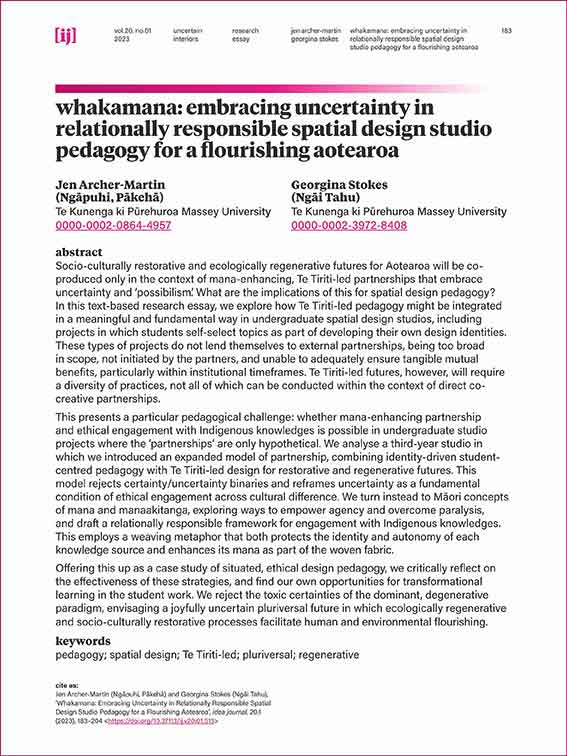Whakamana Embracing Uncertainty in Relationally Responsible Spatial Design Studio Pedagogy for a Flourishing Aotearoa
Main Article Content
Abstract
Socio-culturally restorative and ecologically regenerative futures for Aotearoa will be coproduced only in the context of mana-enhancing, Te Tiriti-led partnerships that embrace uncertainty and ‘possibilism’. What are the implications of this for spatial design pedagogy? In this text-based research essay, we explore how Te Tiriti-led pedagogy might be integrated in a meaningful and fundamental way in undergraduate spatial design studios, including projects in which students self-select topics as part of developing their own design identities. These types of projects do not lend themselves to external partnerships, being too broad in scope, not initiated by the partners, and unable to adequately ensure tangible mutual benefits, particularly within institutional timeframes. Te Tiriti-led futures, however, will require a diversity of practices, not all of which can be conducted within the context of direct cocreative partnerships.
This presents a particular pedagogical challenge: whether mana-enhancing partnership and ethical engagement with Indigenous knowledges is possible in undergraduate studio projects where the ‘partnerships’ are only hypothetical. We analyse a third-year studio in which we introduced an expanded model of partnership, combining identity-driven studentcentred pedagogy with Te Tiriti-led design for restorative and regenerative futures. This model rejects certainty/uncertainty binaries and reframes uncertainty as a fundamental condition of ethical engagement across cultural difference. We turn instead to Māori concepts of mana and manaakitanga, exploring ways to empower agency and overcome paralysis, and draft a relationally responsible framework for engagement with Indigenous knowledges. This employs a weaving metaphor that both protects the identity and autonomy of each knowledge source and enhances its mana as part of the woven fabric.
Offering this up as a case study of situated, ethical design pedagogy, we critically reflect on the effectiveness of these strategies, and find our own opportunities for transformational learning in the student work. We reject the toxic certainties of the dominant, degenerative paradigm, envisaging a joyfully uncertain pluriversal future in which ecologically regenerative and socio-culturally restorative processes facilitate human and environmental flourishing.
Article Details
Author/s and or their institutions retain copyright ownership over works submitted to Idea Journal, and provide the Interior Design / Interior Architecture Educators Association with a non–exclusive license to use the work for the purposes listed below:
- Make available/publish electronically on the Idea Journal website
- Publish as part of Idea Journal's online open access publications
- Store in electronic databases, on websites and CDs/DVDs, which comprise of post-publication articles to be used for publishing by the Interior Design / Interior Architecture Educators Association.
Reproduction is prohibited without written permission of the publisher, the author/s or their nominated university. The work submitted for review should not have been published or be in the process of being reviewed by another publisher. Authors should ensure that any images used in their essays have copyright clearance.

